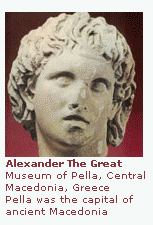One of the institutions that still arouses the admiration of the whole World are the Olympic games. The accepted date of the first Olympic Games is 776 BC. The Olympic games were held for about ten centuries without interruption and were abolished after Christianity prevailed because the Games were considered as pagan relics. The Games were revived in 1896 in Athens, and they have been held from then on, in various countries all over the world, every four years. Similar ancient Greek Games, though of somewhat lesser glamour, were the Pythia held at Delphi, the Isthmia at Corinth, and the Nemea at Nemea in the Peloponnesus near Argos.
 In all these games only pure blooded Greeks participated. Therefore the fact that Philip and his son Alexander and the Macedonians took part in these games, and the fact that the Amphictyonic League invited the Macedonian King Phipip II to protect the Delphic oracle from its voracious neighbors of Amphissa, are two indubitable pieces of evidence concerning the National consciousness of the Macedons at that time. The eminent German historian Beloch in his voluminous Greek History examines the linguistic idiom of the Macedonians and comes to the conclusion that the language spoken by the Macedonians was a Greek dialect, and that the people speaking the Attic dialect could very well understand people speaking the Macedonian dialect and vice versa.
In all these games only pure blooded Greeks participated. Therefore the fact that Philip and his son Alexander and the Macedonians took part in these games, and the fact that the Amphictyonic League invited the Macedonian King Phipip II to protect the Delphic oracle from its voracious neighbors of Amphissa, are two indubitable pieces of evidence concerning the National consciousness of the Macedons at that time. The eminent German historian Beloch in his voluminous Greek History examines the linguistic idiom of the Macedonians and comes to the conclusion that the language spoken by the Macedonians was a Greek dialect, and that the people speaking the Attic dialect could very well understand people speaking the Macedonian dialect and vice versa.
It is true that the eloquent Athenian orator Demosthenes was a fervent supporter of the anti-Macedonian policy. Demosthenes was the representative type of a demagogue preaching local patriotism and it was he who induced the Athenians to fight the battle at Chaeronea. Both in quality and quantity the scales incline heavily towards those who proclaimed the necessity of a Union of the Greeks. At the head of these latter stood the father of Greek Tragedy, Aeschylus, the hero of Salamis (525-456 BC). Aeschylus created a contemporary "Almanach de Gotha" where he set forth the prevailing opinion on the genealogy of the Macedonian dynasty, whose origin he attributed to the mythological Greek period.
Many other renowned poets and philosophers, such as Isocrates (436-338 BC), Pindar (521-441 BC), Aristophanes (448--385 BC), Aeschynes (389-314 BC), Lycias (440-380 BC) and others urged for the necessity of the union of the Panhellenion (the Greek Nation). Naturally Aristoteles (384-322 BC), who is by many considered as the greatest of ancient Greek philosophers, and who furthermore originated from Stageira at Chalkidiki, in Macedonia, was also supporting this request. Other writers, earlier or later than Alexander the Great, like Hesiod of Boetia (7th cent. BC, Herodotus from Asia- Minor (484-425 BC), the Attic historian Thucydides (460-395 BC), the Arcadian historian Polybius (205-125 BC), and the geographer Strabo (58 BC-25 AD) from Cappadocia, Asia Minor, in their extent works clearly and unequivocally state that the Macedonians and Macedonia have always been Greek. Consequently, the dedication of the three hundred panoplies from the Granicos victory, by which the Macedons were termed Greeks, was not just an opinion of the Commander in Chief, the Macedonian King Alexander, but it conformed to an accepted status quo.
European writers of the 20th century, particularly Germans, compare Macedonia of that time with East Prussia of 1870. They accept that, just as East Prussia, (thanks to Bismark), formed the nucleus round which the warring German people....
